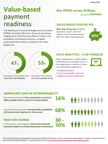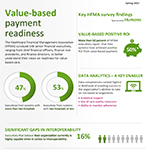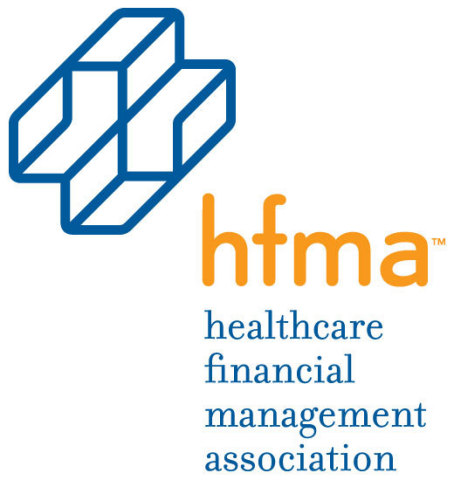WESTCHESTER, Ill. & LOUISVILLE, Ky.--(BUSINESS WIRE)--More than 50 percent of health care financial executives have seen positive return on investment (ROI) from value-based payment models, according to a survey conducted by the Healthcare Financial Management Association (HFMA) and sponsored by Humana Inc. (NYSE: HUM).
HFMA’s Executive Survey: Value-Based Payment Readiness (http://www.hfma.org/value-basedpaymentreadiness/), surveyed 146 senior financial executives, including chief financial officers, finance vice presidents, and finance directors, to better understand their views on readiness for value-based care. Among respondents, 47 percent were from systems with more than two hospitals and 53 percent were from systems with two or fewer hospitals.
“It’s encouraging that many providers are achieving a positive ROI from value-based payment models,” said HFMA President and CEO Joseph J. Fifer, FHFMA, CPA. “Improving our ability to share clinical information across the continuum is key to extending these results and making them sustainable.”
Key findings of the HFMA survey included:
- Positive Return on Investment (ROI)—More than 50 percent of the executives surveyed report their systems have achieved positive ROI from value-based payment models.
- Data Analytics a Key Enabler—Data competencies ranked highest in likelihood of enabling success in the organization’s abilities to take on risk-based arrangements.
- Significant Gaps in Interoperability—Only 16 percent of executives believe that their organization currently is highly capable when it comes to interoperability; 68 percent of executives anticipate interoperability capabilities will be extremely important in three years.
- Need for Change—Respondents expect in three years that 30 to 70 percent of their commercial payments will include value-based mechanisms.
“While the positive ROI for value-based payments and focus on data analytics are promising findings, it’s clear that hospital systems have concerns about their capabilities needed to achieve interoperability,” said Roy A. Beveridge, M.D., Humana’s Chief Medical Officer. “The health care industry has an opportunity to help these hospitals systems chart a course toward interoperability while helping them address the expected rise of patients with chronic conditions.”
The value-based HFMA survey responses are important in that they reflect the needs of hospitals and hospital systems in order to be successful in the transition from fee-for-service to value-based care.
The survey also found that nearly 40 percent of respondents don’t believe that their organizations currently possess capabilities rated as extremely important to succeed in risk-based value arrangements in the areas of interoperability, business intelligence, real-time data access, and effective chronic care management.
“It's important to listen to hospitals, health systems, and physicians,” says Caraline Coats, Humana’s Vice President of the Provider Development Center of Excellence. “By listening, we can better understand the capabilities needed to support our provider partners in value-based care relationships. For example, Humana’s CareBook application enables providers to manage care workflow and data reporting. We can tailor capabilities and tools that help them become more successful population health managers. That support is reflected in Humana’s improved population health results for one million Humana Medicare Advantage members that showed solid improvements in quality, outcomes and costs in 2013.”
With the survey results in mind, HFMA also recommends the following actions from hospitals and health systems:
- Collaborate with payers on consistent measures for care quality. Health care providers are best-served when they seek opportunities to work with payers on streamlining or complementing existing value-tracking efforts.
- Strengthen data-sharing relationships with payers. One key competitive differentiator for health care providers in the time ahead is level of collaboration with payers.
- Prioritize patient engagement. Many survey respondents are anticipating value-readiness gaps when it comes to having infrastructure to support chronic care management.
Findings are based on 146 responses received in February and March 2015. Survey participants were selected randomly from among HFMA members who are financial executives in hospitals and health systems. Respondents held titles of senior finance executive (CFO, vice president of finance, director of finance).
The survey was sent to 952 HFMA members, with a response rate of 15 percent. For a more detailed review of survey results, see http://www.hfma.org/value-basedpaymentreadinesssurvey/.
Humana has nearly 30 years of accountable care experience, reflected in results from approximately 1 million Medicare Advantage members that showed significant improvements in quality, outcomes, and costs in 2013.
Today, Humana has approximately 1.5 million individual Medicare Advantage and 230,000 commercial members, cared for by approximately 45,500 primary care physicians in more than 900 accountable care relationships across 43 states and Puerto Rico. Currently, 54 percent of Humana individual Medicare Advantage members are in value-based relationships (path-to-risk or shared risk). Humana’s goal is to have 75 percent of individual Medicare Advantage members in value-based relationships by 2017. For more information, visit humana.com/accountable-care.
About HFMA
With more than 40,000 members, the Healthcare Financial Management Association (HFMA) is the nation's premier membership organization for healthcare finance leaders. HFMA builds and supports coalitions with other healthcare associations and industry groups to achieve consensus on solutions for the challenges the U.S. healthcare system faces today. Working with a broad cross-section of stakeholders, HFMA identifies gaps throughout the healthcare delivery system and bridges them through the establishment and sharing of knowledge and best practices. We help healthcare stakeholders achieve optimal results by creating and providing education, analysis, and practical tools and solutions. Our mission is to lead the financial management of health care.
About Humana
Humana Inc., headquartered in Louisville, Kentucky, is a leading health and well-being company focused on making it easy for people to achieve their best health with clinical excellence through coordinated care. The company’s strategy integrates care delivery, the member experience, and clinical and consumer insights to encourage engagement, behavior change, proactive clinical outreach and wellness for the millions of people we serve across the country.
More information regarding Humana is available to investors via the Investor Relations page of the company’s web site at www.humana.com, including copies of:
- Annual reports to stockholders;
- Securities and Exchange Commission filings;
- Most recent investor conference presentations;
- Quarterly earnings news releases;
- Replays of most recent earnings release conference calls;
- Calendar of events (including upcoming earnings conference call dates and times, as well as planned interaction with research analysts and institutional investors); and
- Corporate Governance information.





